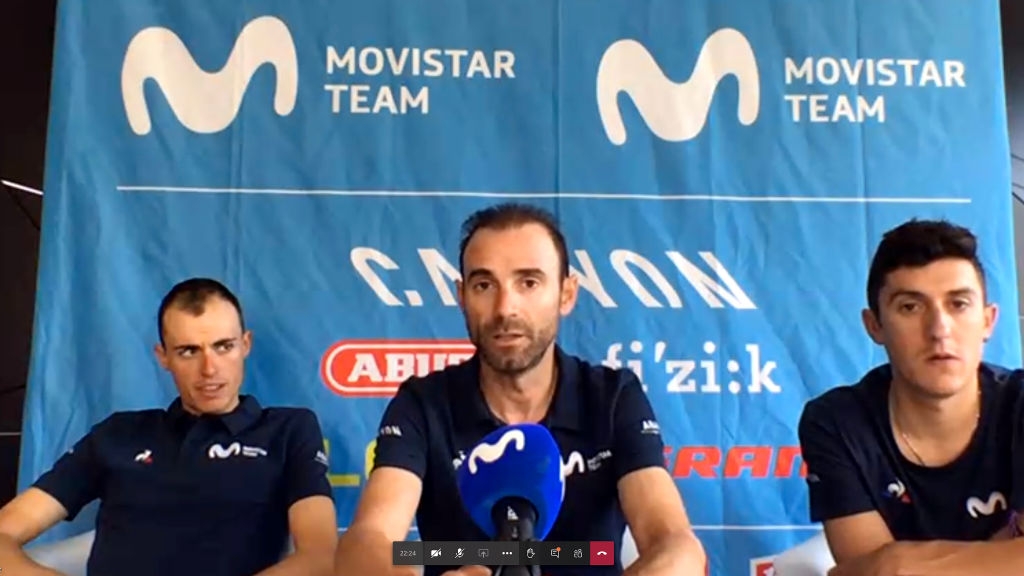Valverde: We have to race the Vuelta a España like a series of Classics
Movistar leader warns 'this can be lost from day one'

The years come, the years go, but as he enters his fifth decade Alejandro Valverde continues to form a seemingly indestructible part of the Vuelta a España. The 40-year-old Movistar veteran warned fans that the rules of the game have changed this autumn.
The coronavirus pandemic - or as Valverde euphemistically put it "the way things are right now" - and its possible consequences for the Vuelta, the change in weather conditions caused by the change in dates, and an exceptionally difficult first week caused by the removal of the Dutch stages have all combined to make the best way to race the Vuelta "as if it were a series of Classics."
"It's a very tough Vuelta, one you can lose from day one, and we have to take it on the day by day," said the former winner, who heads into his 14th Vuelta.
"With the weather and given how things are right now, we don't know how far we can go. So we have to treat the race as if it were a series of Classics each day and do each one the best possible."
Quite apart from the climate and the COVID-19 issues, there is also the question of the opposition, which, as both Valverde and his teammate Enric Mas pointed out in a press conference on Monday, is exceptionally formidable in 2020 - on par with last year's Tour de France.
But when Valverde, Mas and their teammate Marc Soler were asked if they would have preferred to do the Giro d'Italia, where the field is notably less star-studded, the Spanish trio were adamant they were more than content to be right where they were rather than over in Italy.
"Even if some leaders have retired, the Giro's very fast, very hard, the Vuelta's my home race, I don't miss it," Valverde said.
Get The Leadout Newsletter
The latest race content, interviews, features, reviews and expert buying guides, direct to your inbox!
"I was looking at doing the Giro, but now I'm focussed on the Vuelta," added Soler.
"Having such a hard start here will make it less nervous," added Mas, "and that will help ease the tension of the first week. Once we've got the GC sorted out a bit, then it won't be as tough on the nerves as the Tour."
As for what they hope to achieve in such exceptional circumstances, Mas, who was fifth in the Tour de France, pointed out that, "in France, I got better as it went on.
"I have to keep my feet on the ground, the rivals here are almost the same, so let's see what happens. I have no false hopes, only that I hope to start the Vuelta better than I did in the Tour," Mas said. "A top five wouldn't be great, I want the top three, to get on 'the box' - the winner's podium."
The always upbeat Valverde added, "We have to be really motivated and stay really motivated. We need to go in convinced we can win, even if only one person actually does win."
Valverde said there was a chance to beat Primož Roglič (Jumbo-Visma), since the Slovenian defeated him in last year's Vuelta.
"It's possible, we just need to hope he's a bit worse than in the Tour, not a bit better. Because if he's a bit better, he would be impossible to beat."
The weather, the dates, the pandemic and the opposition make the 2020 Vuelta a España different to other years. But another big change is that for the first time in its history, rather than encourage the public to get out and watch the race from the roadside, the Vuelta organisation is actively trying to ensure fans watch the race from their living rooms on TV.
"It'll be particularly odd here in the Basque Country, where I've always seen crowds out at races, even at the amateur level," said Soler. "It's been complicated, and strange, but it is what it is."
"Me and Enric reckon the same," Valverde said. "This year, it's all about watching the race from home, but I'm sure that further down the line, things will change back."
But with or without the public, at the 2020 Vuelta, just as he has done since 2002, Valverde continues to soldier on.
Alasdair Fotheringham has been reporting on cycling since 1991. He has covered every Tour de France since 1992 bar one, as well as numerous other bike races of all shapes and sizes, ranging from the Olympic Games in 2008 to the now sadly defunct Subida a Urkiola hill climb in Spain. As well as working for Cyclingnews, he has also written for The Independent, The Guardian, ProCycling, The Express and Reuters.
